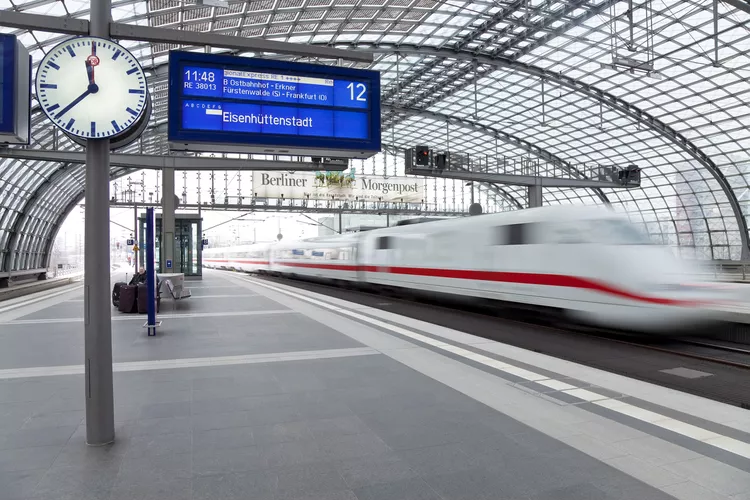Train travel is the best way to get around Germany. Trains operate frequently and affordably, reaching every corner of the country while being fast and efficient.
Deutsche Bahn, the German Railway company, provides comprehensive coverage within Germany and to other parts of Europe. Their website offers information in English, including train schedules, affordable travel deals, and the option to purchase tickets online.
However, at times, you may need to converse with a local German speaker or need assistance interpreting your train ticket or schedule in German. Trying out some deutsch with the agent at the ticket counter or fellow travelers can be beneficial. It is well-known that many Germans speak English, but learning ein bisschen (a little) German can significantly enhance your travel experience.
In this German travel glossary, you’ll discover the most-used German vocabulary and expressions related to rail travel in Germany. Equip yourself with essential phrases that you can use on trains or at train stations.
(You will find the pronunciations in parentheses. Simply read them out loud, emphasizing the capitalized part of the word.)
Gute Reise! (GOO-tuh RY-suh) – Have a good trip!
German for Travelers: Train Travel Glossary
| English | German |
| When does the train leave to….? | Wann fährt der Zug nach…? (Von fairt dare tsoog nach…?) |
| When does the train arrive in…? | Wann kommt der Zug in…an? (Von kommt dare tsoog in… ahn?) |
| How much is the ticket? | Was kostet die Fahrkarte? (Vas KOS-tet dee FAHR-kartuh?) |
| A ticket to…, please | Bitte eine Fahrkarte nach… (BIT-tuh EYE-ne FAHR-kartuh nach….) |
| round trip | hin und zurück (heen oont tsoo-RIK) |
| one way | einfach (EYEN-fach) |
| First class | Erste Klasse (AIR-stuh CLASS-uh) |
| Second Class | Zweite Klasse (TSV-eyete CLASS-uh) |
| Thank you | Danke (DAHN-kuh) |
| Do I have to change trains? | Muss ich umsteigen? (Moos ish OOM-shty-gen?) |
| Where is the platform? | Wo ist der Bahnsteig? (Vo ist dare BAHN-shtyg?) |
| Is this seat free? | Ist der Platz hier frei? (Ist dare plats heer fry?) |
| This seat is occupied. | Hier ist besetzt. (Here ist BUH-setst.) |
| Could you please help me? | Können Sie mir bitte helfen? (KEN-nen zee mer bit-TUH HEL-fen?) |
| Excuse me, I think this is my seat | Entschuldigen Sie, ich glaube das ist mein Platz. (ent-SHOOL-degen zee, ish GLOU-buh das ist mine plats.) |
| Main Train Station | Hauptbahnhof abbreviated to Hbf (HAUP-bonn-hof) |
| Track | Gleis (G-lie-s) |
| Departures | Abfahrt (AB-fart) |
| Arrivals | Ankunft (An-coonft) |
| Train Platform | Bahnsteig (BONN-sty-g) |
| Ticket | Fahrkarte (FAR-Cart-eh) |
| Reserved | Reserviert (RES-er-veert) |
| Sleeping Car | Schlafwagen (Shh-LAF-vagen) |
| Cheaper, less luxurious, sleeper with 4-6 bunks | Couchette (koo-SHET) |
| All Aboard | Alle Einsteigen |
| Wagon | Wagen (VAHG-in) |
| Display board | Anzeigetafel (AHN-tsey-guh-tah-fuhl) |
| City center | Stadtzentrum |
| North, South, East, West | Nord, Süd, Ost, West |
| How much is a ticket to X? | Wie viel kostet eine Fahrkarte nach X? |
Tips
Remember that in Germany, the date format is written as dd.mm.yy. For instance, Christmas 2019 is displayed as 25.12.19. Additionally, time is typically expressed using the 24-hour clock format. Therefore, 7:00 am is noted as 7:00, while 7:00 pm is noted as 19:00.
When searching for your reserved seat, the digital display should indicate your last name above the seat number assigned to you on your ticket. Alternatively, it may feature a printed card or a basic description of your origin and destination. It is not uncommon for someone to occupy your seat, as reservations are not mandatory. However, by using our handy glossary, you can typically sort it out quickly, and most passengers will be accommodating in moving to their correct seat.
Types of Trains and Abbreviations
- InterCity-Express (ICE) – These high-speed, long-distance trains traverse the country and extend into neighboring EU countries.
- EuroCity (EC) – International long-distance trains.
- InterCity (IC) – Long-distance trains connecting German cities.
- EuroNight (EN) – International night trains featuring sleeping cars.
- Regional-Express (RE) – The fastest regional trains, with fewer stops than regular trains.
- Interregio-Express (IRE) – Local services covering longer distances than RE trains.
- RegionalBahn (RB) or Regio – Standard regional trains.
- S-Bahn (S) – Local commuter trains typically included in public transport tickets.





